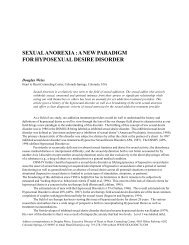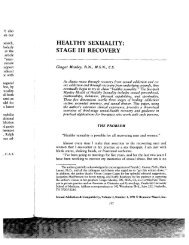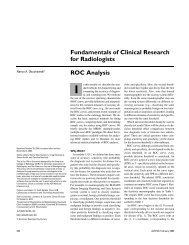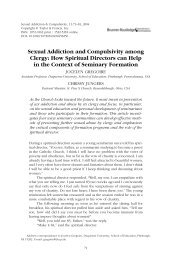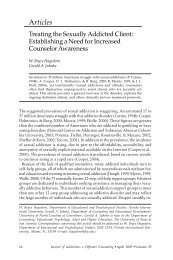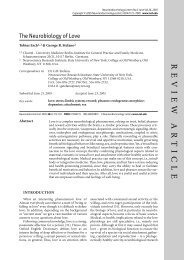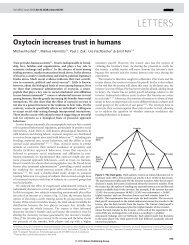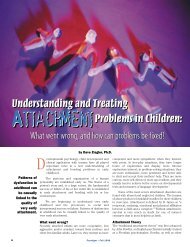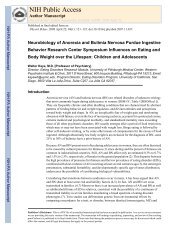An Overview of Psychiatric Ethics
An Overview of Psychiatric Ethics
An Overview of Psychiatric Ethics
You also want an ePaper? Increase the reach of your titles
YUMPU automatically turns print PDFs into web optimized ePapers that Google loves.
Applied <strong>Psychiatric</strong> <strong>Ethics</strong>3most compelling examination <strong>of</strong> the question “how did this happen?”, although the “why did thishappen” remains elusive. This is the most critical question, as any attempt to prevent recurrence <strong>of</strong>such crimes requires a clear articulation as to why they occurred, so that such preconditions canbe identified and prevented in the future. Dudley and Gale noted that the “why?” emerged througha process <strong>of</strong> peer pressure, uncritical devotion to duty, careerism, denial facilitating deceptivelanguage, and the influence <strong>of</strong> a faceless bureaucracy. 360The intellectual origins <strong>of</strong> the Nazi doctors require some consideration in order to try to frame thekind <strong>of</strong> ethical oversight that would prevent such crimes from re-occurring. Many bioethicists havegrappled with the apparent intellectual preconditions to the Nazi project. As described previously,the sociologist Max Weber warned us that bureaucracies had lost sight <strong>of</strong> values and concernedthemselves only with outcomes. This loss <strong>of</strong> values led to humans in the social system being placedin a moral void, or what he described as a “polar night <strong>of</strong> icy darkness”. 172 Despite the contribution<strong>of</strong> an amoral, pragmatic bureaucracy in the Nazi era, the eugenic movement remains the mainculprit in the crimes <strong>of</strong> the Nazi doctors. Malthus had warned humanity that expanding populationsthreatened the very existence <strong>of</strong> human-kind on the planet. 361 Malthusian ideas encouraged theviewpoint that the intrinsic value <strong>of</strong> human beings was negotiable. Eugenics was by no meansunique to German psychiatry. The British academic Francis Galton was so enamoured <strong>of</strong> theseminal thesis <strong>of</strong> Darwin, that he called for all public policy to be based upon the notion <strong>of</strong> naturalselection. 362 Eugenic ideas permeated American psychiatry contemporaneously with Germanpsychiatry. 363 In 1913, the German psychiatrist Alfred Ploetz founded the “German Society for RacialHygiene”. <strong>An</strong>other psychiatrist, Ernst Rüdin referred to the cause <strong>of</strong> removing inferior genetic stockfrom the population as ”Schädlingsbekämpfung” (pest control). In 1918, Emile Kraeplin called forstrong political leadership to effect ‘a decline in mental debility’. 36451Hitler’s moral philosophy was predicated upon Darwinian principles. Many leading Darwinianbiologists and social thinkers in Germany believed that Darwinism had superseded traditionalJudeo-Christian and Enlightenment ethics, in particular the value such philosophies placed uponall human life. The moral relativism which emerged from the exaltation <strong>of</strong> the evolutionary “fitness”<strong>of</strong> the species as the source <strong>of</strong> a moral good was at the core <strong>of</strong> this “pseudo-ethics”. 365 O’Mathúnaargued that five key ideas were central to the actions <strong>of</strong> the Nazi doctors – moral relativism, blurreddistinctions between animals and humans, the existence <strong>of</strong> human inequality, the notion that somelives have no value and natural selection as a valid determinant <strong>of</strong> human dignity. 366Regardless <strong>of</strong> the intellectual bankruptcy <strong>of</strong> Nazi racial ideology, Darwinian ideas and evolutionarypsychiatry are still popular. Indeed, there is a strong evolutionary psychiatry movement, whichseeks to understand human psychopathology in terms <strong>of</strong> the natural history <strong>of</strong> our species. 367Moreover, the conceptualization <strong>of</strong> psychiatric disorder is moving inexorably towards the molecularlevel, 368 where depression or anxiety may be defined more in terms <strong>of</strong> the possession <strong>of</strong> particularalleles <strong>of</strong> genes, rather than the traditional verstehende Psychologie <strong>of</strong> Jaspers. 369 Whilst it is notreasonable to assume a moral equivalence between the current, somewhat reductionist paradigms<strong>of</strong> evolutionary psychiatry or genetics, there is a need to reflect upon neuropsychiatry potentiallylosing sight <strong>of</strong> the intrinsic value <strong>of</strong> humans. Kant’s notion <strong>of</strong> “Menscheit” refers to the humanpotential for autonomy, or unconstrained rational self–governance. 370 This is one approximation <strong>of</strong>the intrinsic value <strong>of</strong> humans, even the most irrational or intellectually disabled person. Kant’s formula<strong>of</strong> humanity has it that humans must be ends in themselves, and never a means to such an end. 59Such notions were clearly lost in the Nazi era, a fact made all the more tragically ironic in that AdolfEichmann, the Nazi functionary who was responsible for the so-called “Final Solution”, proudlyproclaimed at his trial for crimes against humanity that he was a Kantian. 74Losing sight <strong>of</strong> the essential value <strong>of</strong> humans seems to be at the core <strong>of</strong> the <strong>of</strong> the Nazi doctors’crimes. The moral philosophy which emerged in the aftermath <strong>of</strong> the Holocaust, through theworks <strong>of</strong> Baumann 170 and Levinas, 371 emphasized that the crisis in Western ethics brought aboutby the Nazi era resided in the perceived loss <strong>of</strong> the value <strong>of</strong> human beings, no matter what theirbackground.A common method <strong>of</strong> argument in bioethical debate is to position a particular issue with reference toNazism. Polemicists like Peter Singer, whose advocacy for termination <strong>of</strong> grossly deformed fetusesis <strong>of</strong>ten compared to the excesses <strong>of</strong> Nazism, contribute to such emotive debates. What is not clearare the specifics <strong>of</strong> the fundamental moral failure <strong>of</strong> the Nazi doctors. Many rationalizations wereIMET AN OVERVIEW OF PSYCHIATRIC ETHICS



